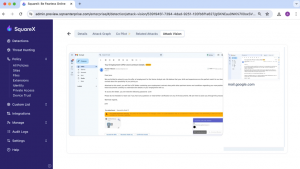Homes.com Development Director : Splunk + User Engagement | #splunkconf2013
![]() Speaking to theCUBE hosts John Furrier and Dave Vellante at the recently concluded Splunk Worldwide Users’ Conference, Robert Osborne, the director of application development and systems at Homes.com, remarked that Big Data has transformed the online real estate market. The fifth largest portal for home listings, his website is riding this trend into uncharted territory.
Speaking to theCUBE hosts John Furrier and Dave Vellante at the recently concluded Splunk Worldwide Users’ Conference, Robert Osborne, the director of application development and systems at Homes.com, remarked that Big Data has transformed the online real estate market. The fifth largest portal for home listings, his website is riding this trend into uncharted territory.
Homes.com is powered by VMware-virtualized Cisco UCS blade servers, NetApp storage systems, and load balancers from F5 Networks. The data center that houses the environment is located in an AWS Availability Zone facility to provide a low-latency uplink to the cloud, which Homes.com utilizes to offload traffic spikes.
Noting that the number of visitors to the website increases 40 percent year-over-year in 2012, Osborne says that scalability is a top priority for his team. The difficult task of keeping up with demand is made somewhat easier by the fact that Homes.com, a subsidiary of Dominion Enterprises, is a “very lean” unit with about a dozen employees. More traffic means more data, Osborne explains, which is where Splunk comes in. The platform aggregates and processes traffic-related information to identify engagement factors that can focused on to boost the bottom line.
Asked to elaborate on Homes.com’s relationship with Splunk, the executive says that it was Dominion Enterprises CIO Joe Fuller who first recognized the platform’s potential to drive revenue. Adoption didn’t come easily, he reflects, but the move has paid off.
“Our first challenge was explaining to our product people what Big Data is. Here’s the types of data that we have, here’s what we’re not doing with it, what are some things that we can do with it,” Osborne says. “When we start thinking about what’s the most valuable data that we collect on the operations side … probably our access logs, the footprint of all our users, the telltale sign of how our users engage with our website.”
Homes.com features a Splunk-powered recommendation engine that analyzes these access logs to tailor search results for individual users. Form submissions are also processed to connect buyers with real estate agents who subscribe to the website’s lead generation service. Osbourne theorizes that as mobile continues to grow, information from the recommendation engine could be integrated with geolocation data to let brokers engage buyers who are near properties that may interest them.
Watch the interview below for more insights into the intersection of real estate, mobile and Big Data.
A message from John Furrier, co-founder of SiliconANGLE:
Your vote of support is important to us and it helps us keep the content FREE.
One click below supports our mission to provide free, deep, and relevant content.
Join our community on YouTube
Join the community that includes more than 15,000 #CubeAlumni experts, including Amazon.com CEO Andy Jassy, Dell Technologies founder and CEO Michael Dell, Intel CEO Pat Gelsinger, and many more luminaries and experts.
THANK YOU

















